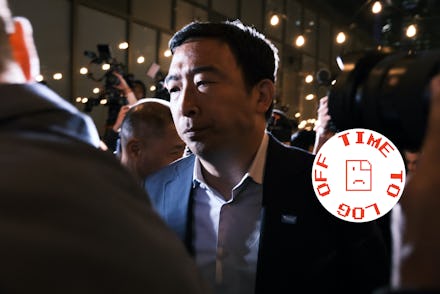Andrew Yang needs to stop trying to make Andrew Yang happen

Time to Log Off is a weekly series documenting the many ways our political figures show their whole asses online.
Cast your memory back to the halcyon days before the soul-crushing slog that was the 2020 Democratic presidential primary. The world was fresh and exciting, the air a little sweeter, the will to live a little stronger, and — crucially — Andrew Yang was not a two-time political loser intent on awkwardly shoehorning himself into high elected office despite having zero history of public service or policy-making.
Alas, those days have come and gone. Now we live in this accursed year of two thousand and twenty one, and despite his best (?) efforts, Yang is neither president of the United States nor the mayor of New York City. He is, however, a committed poster, who spends much of his days waxing philosophical about his new "Forward" political party and the nature of politics in general.
Which brings me to Yang's latest bit of penetrating insight into the shortcomings of the American electoral system:
The tweet, the first in a longer thread on the failings of the country's two-party system, is noteworthy for being broadly correct, and specifically wrong, all at once. Erwin Schrodinger, eat your heart out.
What Yang gets right — and which he later expounds upon in subsequent tweets — is that the rigidity of America's two-party system can often be both stifling and counterproductive. The binary "winner takes all" dynamic reinforced by having two virtually monolithic parties is certainly a major factor in the institutional gridlock that's become the political norm in Washington.
And yet!
Unfortunately Yang's largely accurate diagnosis of a legitimate issue is followed by a meaningless prescription for relief. "What if instead of two political parties that exist on a single spectrum, we had four that exist on that same spectrum" is hardly a radical rethinking of what the political landscape could look like. Putting aside the fact that there is no functional difference between "moderate Republicans" and "conservatives" beyond the volume of their voice, Yang's brilliant idea (couched with the requisite "at least") is simply to add additional electoral infrastructure to an existing binary. There's no attempt to acknowledge that political beliefs often don't exist on a straight line at all.
In Israel, for instance, a country whose governing coalition is perpetually at risk of dissolution thanks to the many, many political parties vying for power in the Knesset, the 2006 election was upended by Gil, a party constituted solely to represent the interests of pensioners — that is to say, a party wholly off the "liberal-to-conservative" spectrum. There's no accounting for something like that in Yang's big idea.
Embarrassingly, Yang's follow up tweets are both factually incorrect (he insists the U.K. has five political parties. It has 11) and totally unoriginal in their prescriptiveness. His suggestions of open primaries and ranked choice voting are already in use across much of the country.
It's not that Yang is incorrect that the two-party system is a major source of disunion and political acrimony. Far from it. It's just that when you actually look at what he's saying, he doesn't really seem to have any brilliant ideas beyond "I should start my own political party based off some PoliSci 101 philosophies that will keep me in the game, while acting as a genuine spoiler for the Democrats, so they won't be in a position to enact many of the policies I, myself, believe in."
Andrew Yang. You tried running for national office, and you lost. You tried running for local office, and lost. Now you're trying to pass off a series of extremely well-worn political musings as some sort of revolutionary philosophy. I appreciate the effort, sincerely I do. But this isn't helping. This is just a sign that it's really time to log off.